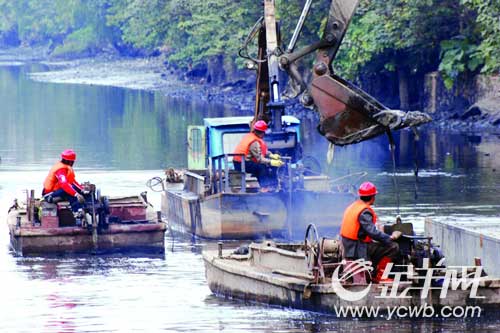A total of 48.6 billion yuan (about US$7.1 billion) will be spent by mid 2010 to clean up the Pearl River and its tributaries in China's southeastern Guangzhou City, the municipal government said Tuesday.
The announcement was made in a city program on sewage treatment and comprehensive improvement of streams. The program went into effect as workers began construction on the sewage treatment plant for the Shijinghe River on Tuesday afternoon.
 |
|
Workers began construction on the sewage treatment plant for the Shijinghe River on Tuesday afternoon.
|
Shijinghe River, a tributary of the Pearl River, is nicknamed by local people as "the black dragon river" because of its severe pollution and foul odour.
Guangzhou City is the center of the Pearl River Delta region in Guangdong Province. The region has been one of the fastest growing areas in China since the country adopted the reform and opening-up policy, mostly due to direct foreign investment in manufacturing and export processing. However, lack of proper sewage treatment has led to serious deterioration in the river's water quality.
Guangdong Province's relatively clean inland areas will face a growing threat from pollution if environmental problems are not properly handled during the industrial transfer, a government report said last month.
Zhang Hu, the director of Guangzhou municipal bureau of water affairs, said Tuesday that projects to be carried out would also include those on water regulation, waterlogged streets treatment, and rain sewage distribution and transformation.
Zhang said that the city will build up 30 sewage treatment works to enhance the city's sewage treatment capacity by 2.25 million tonnes per day. A total of 121 streams with an aggregate length of 388.52 kilometers will also be treated.
The program aims to ensure an 85 percent treatment rate of domestic sewage, and a fundamental enhancement of the water system of the city before it holds the 2010 Asian Games November 12 to November 27 of 2010, added Zhang.
Guangzhou mayor Zhang Guangning said that as Guangdong Province is facing a continuous pressure from population increase, resource and environmental aspects along with high economic growth, the programme met urgent needs. "Taking a scientific approach, the programme will promote harmonious development of human beings and nature."